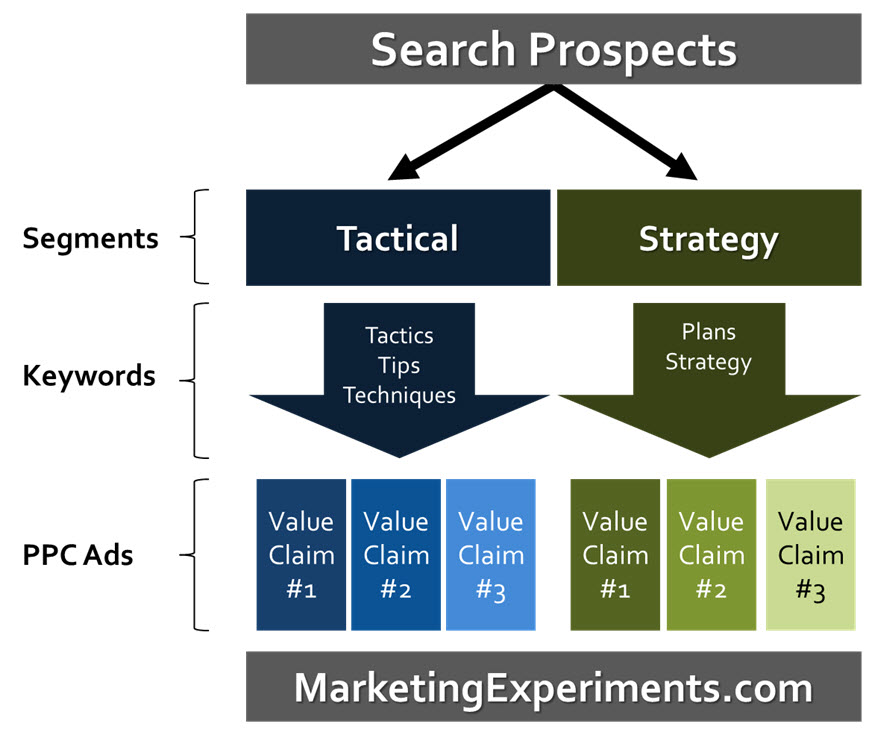Is there another audience, beyond your current one, that could appreciate what you’re already doing right now?
That group of potential customers could find value in what you have to offer; you only need to know the right messaging to communicate that value to them.
But how do you do that? How do you both find that audience and communicate your value proposition to them?
Pay-per-click (PPC) advertising could be your ticket to learning about those new customers and then effectively communicating to them.
That’s the theory behind the latest MECLABS Live Test, set to run at Web Optimization Summit 2014 in New York City this week. In today’s MarketingExperiments Blog post, I’ll give you a preview of that test.
Background
While speaking at a marketing association event, Jon Powell, Senior Manager of Research and Strategy, MECLABS, realized the attendees were not the typical audience he spoke to through MarketingExperiments.
That revelation got him thinking.
“The key question is, ‘How do I talk to them in a way that gets them interested?’” Jon said. “Of all the things we have at MarketingExperiments … research … experiments … what focus of content or what claim of value would connect with them the greatest, and how can I figure that out.”
One way to learn from new customers is with PPC testing. It requires no need for design or development. Therefore, it’s a fast and resource-light channel to perform testing on.
Both the MarketingExperiments audience and this newfound group of prospects all search for the same general information, products or services. They have similar motivation. However, each segment uses different terminology to find what they are looking for.
Based on keyword research and examining words that visitors used to reach the MarketingExperiments site, Jon and his team identified two types of search terminology that visitors used to match the same motivation: strategy and research.
Test 1. Pre-Summit look at terminology
Before the live test for this Summit was even conceived, Jon was already working with Will Duke, Marketing Manager, MECLABS, on PPC ads for MarketingSherpa, the sister company of MarketingExperiments.
They tested the terms, research and strategy against one another in the PPC channel. Here are the two ads:
The result?
The research-focused ad decreased clickthrough 62% compared to the strategy-focused ad. Clearly, marketers don’t seem interested in research. So that led us to our next pre-Summit test.
Test 2. Pre-Summit dive into strategy ads
The team decided to run a test before Summit to ensure validity could be acquired in the timeframe, and to provide additional discoveries to present at Summit.
The goal of Test 1 used the value proposition of MarketingExperiments to see which one of the brand’s value claims resonated best with marketers:
- The largest public library
- The first public library
- The latest public library
So the team created these three ads using each of the claims:
We’ll be able to learn which value claim best matches the motivation of visitors searching for information about marketing strategy and tactics.
Test 2 winners
The winners of Test 2 will be revealed on Day 1 of Summit, and we’ll update this post with those results here on Wednesday.
UPDATE: So what were the results? Jon shared Wednesday morning that the “Best Marketing Strategies” PPC ad won by increasing clickthrough by 37%. That means the “first” claim won and seemed to resonate best with marketers.
Test 3. Live from Summit
Test 3 will take the winner and focus even deeper on its value claim. We’ll provide the audience with evidentials that back up the claim, and allow them to craft PPC ads of their own. Jon provided the audience with a PPC Ad Optimization Tool to craft those treatments.
Jon and his team will pick five audience-crafted ads and allow the audience to select two of those to run in the test.
This second test will question how to make a claim we now know appeals to prospects even more attractive. Does a general ad draw them with curiosity? Does specificity answer any doubts that your link is worth a click?
Be on the lookout in the B2B Marketing Newsletter of our sister company, MarketingSherpa, for a case study of the entire test and the key takeaways you can pull and apply to your own efforts. We’ll review the steps the team took, as well as the results and what they could mean for your PPC efforts.
A possible alternate test
Testing is never really done. It’s continuous process of learning. While developing the live test, the team also discovered another potential term: tactical. This terminology group would include keywords like “tactics,” “tips” and “techniques.”
I wanted to share the potential PPC ads the team created using this term as well.
We broke the test up into smaller digestible bites for the live test, but we could have actually run the three claims for both the tactical and strategy terms simultaneously. To help my fellow visual people, here’s how the test design would look graphically:
You might also like
PPC Advertising: 5 winning display ad tactics that increased paying customers by 2,900% and dropped cost-per-lead 37% [Case study]
Paid Search Marketing: 3 optimization ideas to test in your next PPC campaign [More from the blogs]
Search Marketing: 46% more conversions from PPC ad test [More from the blogs]
Live From Web Optimization Summit: 2 testing methodologies an e-commerce company used to increase total conversion rates by 12% [More from the blogs]







